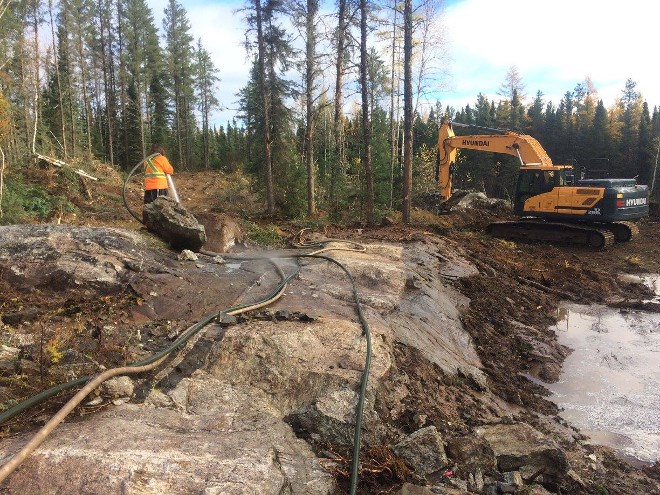Rock Tech Lithium, owners of a lithium deposit in northwestern Ontario, are poised to start construction this year on a processing plant in Germany that will be fed by its mine project near Lake Nipigon.
The Vancouver-based junior miner, with strong European connections, announced Dec. 30 that it has raised U.S.$39.6 million (Cdn$50.7 million) of which a portion is earmarked to develop of its spodumene deposit, the Georgia Lake Project, in the Beardmore area.
Spodumene is the most widely used lithium because of its high lithium content.
According to a news release from Rock Tech, approximately U.S.$5.8 million being set aside for Georgia Lake to do drilling, engineering and infrastructure work at the site, 145 kilometres northeast of Thunder Bay, along with environmental baseline and permitting work.
But the bulk of the funds - U.S.$31.5 million - are dedicated toward the company's first lithium hydroxide converter and refinery facility in Guben, Germany. Construction begins this year.
The material mined at Georgia Lake would be processed at this chemical plant, called a 'converter,' into lithium hydroxide, a chemical used in battery production.
The company wants to become a global producer of battery-grade lithium hydroxide for the electric vehicle and battery storage sectors in North America and Europe.
According to the company's investor presentation, Rock Tech aims to build a network of five converter plants by the end of this decade, four in Europe and one in North America.
Late in 2020, Thunder Bay was on the company's list for a plant through a partnership with Avalon Advanced Materials, owners of the Separation Rapids lithium project, north of Kenora.
But talk has since cooled off.
The Thunder Bay Community Economic Development Commission referred inquiries on the status of a potential plant in the city to Rock Tech, which did not immediately respond for comment. Neither did Avalon.
The Georgia Lake deposit, located five kilometres off Highway 11, has measured and indicated resources of 6.6 million tonnes, grading 1.16 per cent lithium oxide, and an inferred resource of 6.7 million tonnes, grading 1.16 per cent. The property has both open pit and underground mining potential.
The aim there is to start mining in late 2023 and produce a spodumene concentrate for transport to Thunder Bay and shipment to Germany for the conversion.
The company's plans are to flip the switch on the lithium converter in Germany in early 2024.
When it comes to processing, Rock Tech is adopting a Europe-first strategy.
Last year, Rock Tech Chairman Dirk Harbecke said in interviews with analysts that the reason the first plant is being built in Germany is because Europe is two to three years ahead of North America in the adoption of electric vehicles. A facility would be built in Thunder Bay later on, he said, to deliver lithium hydroxide to Canadian and U.S. battery cell manufacturers.
The company hasn't put a date on when that would happen.
Harbecke praised the strategic location of its deposit and northwestern Ontario's transportation links are ideal to supply automakers in Ontario and Michigan.
In a year-end statement to shareholders, Harbecke dropped no hint of where the next converter location might be located.
"We have signed our contract with the city of Guben to build Europe's first lithium hydroxide converter. Planning and starting construction for this major project in 2022 is what we're setting everything up for at the moment. We are aiming to secure our second converter location in the upcoming year and will continue pushing ahead our mission to localize lithium hydroxide production."




